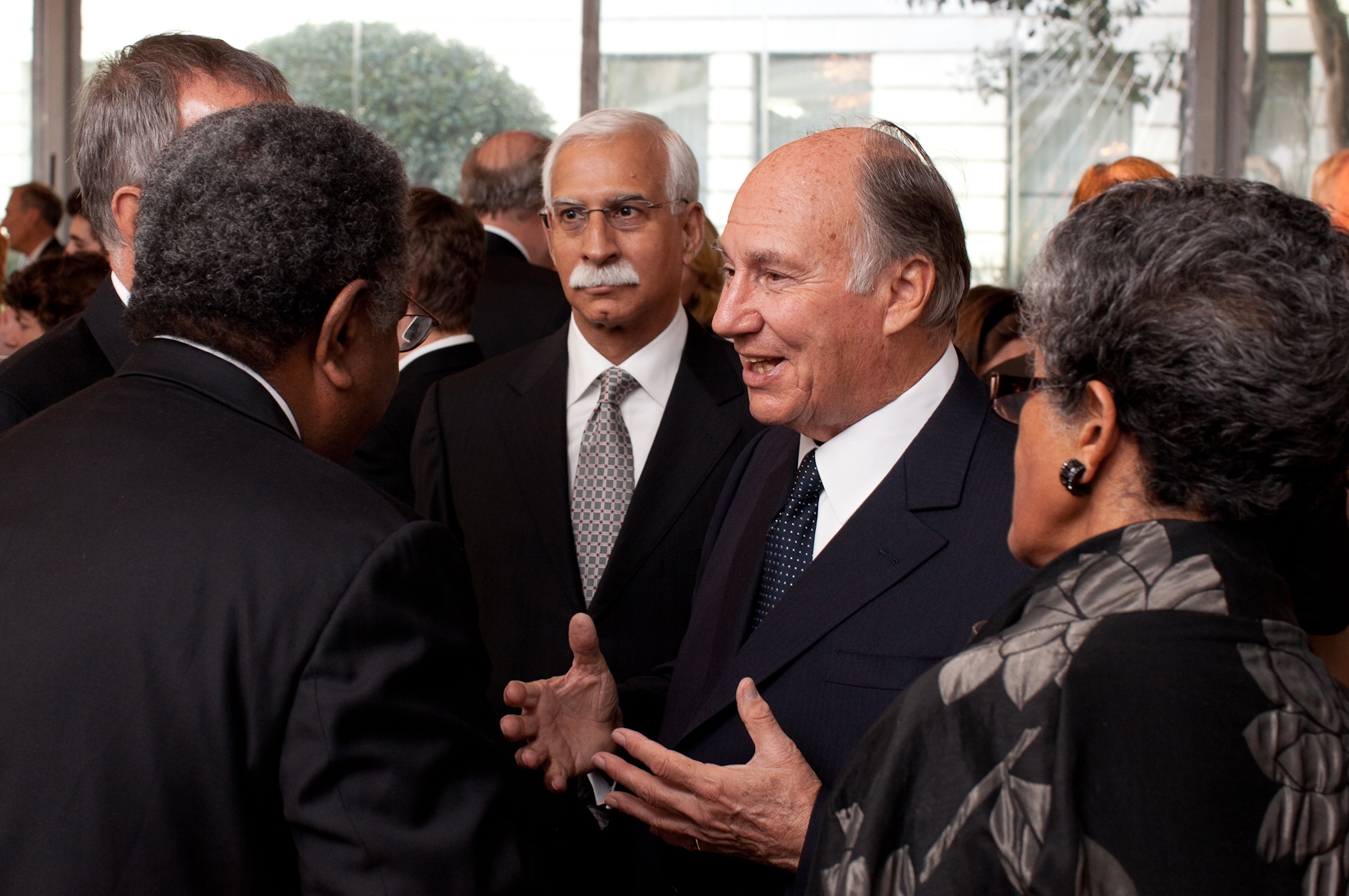The University of California San Francisco Medal, which was established in 1975, replaces the granting of honorary degrees and recognises outstanding personal contributions in areas associated with the UCSF's health science mission. Recipients of the Medal are honoured each year in the spring at the University's Founders Day Banquet.
Describing the Aga Khan Development Network's concern for improving quality of life amongst the populations in which it operates, Mawlana Hazar Imam explained the pivotal importance of civil society: “It is really the sum of human endeavour in structured non-governmental organisations that aim to impact positively all the key forces which condition peoples' quality of life.”
 Mawlana Hazar Imam delivers acceptance remarks after being awarded the 2011 UCSF Medal at the University's Founders Day Banquet. Farhez Rayani
Mawlana Hazar Imam delivers acceptance remarks after being awarded the 2011 UCSF Medal at the University's Founders Day Banquet. Farhez Rayani“In developing civil society, education and healthcare are absolutely critical,” Hazar Imam continued. “We are not trying to bring mediocrity to the developing world. We are trying to do exactly what UCSF is doing, which is to bring quality and excellence.”
The UCSF is recognised as a leading university dedicated to promoting health worldwide through advanced biomedical research, graduate level education in the life sciences and health professions and excellence in patient care. It is a world-class institution with extensive resources and specialist capacity in the medical field.
“We hope that this recognition of the work of the Ismaili Imamat by UCSF will pave the way to further strengthen our partnership,” commented Mahmoud Eboo, President of the Ismaili Council for the USA. “It would be beneficial not only to the US and international Jamats, but also to the citizens of California and those who live in the societies where AKDN operates.”
The AKDN's collaboration with UCSF started in 2006 when programmes were established with the University's Global Health Institute to strengthen the Aga Khan University's training and research programme in family medicine based in Dar es Salaam, Tanzania. In 2009, a Memorandum of Understanding was signed between AKU and UCSF to support their promotion of equitable human advancement and social justice in less privileged parts of the world. The MOU followed the signing of an agreement of cooperation between the State of California and the Ismaili Imamat, reaffirming their shared commitment to confront poverty.
 Mawlana Hazar Imam and Dr Haile Debas discuss opportunities for shared collaboration between the Aga Khan University and UCSF, together with AKU President Firoz Rasul and others. Dr Debas, the Founding Executive Director of Global Health Sciences at UCSF, is also an AKU trustee. Farhez Rayani
Mawlana Hazar Imam and Dr Haile Debas discuss opportunities for shared collaboration between the Aga Khan University and UCSF, together with AKU President Firoz Rasul and others. Dr Debas, the Founding Executive Director of Global Health Sciences at UCSF, is also an AKU trustee. Farhez Rayani“With this partnership, the University of California, San Francisco's internationally recognised expertise will be able to impact parts of the world that would not otherwise benefit from these capabilities,” said Firoz Rasul, President of the Aga Khan University. “Two-way partnerships such as this one build capacity in the developing world where it is needed most, but more importantly, they enable innovation and the creation of knowledge across our globalising world.”
The other recipients of the 2011 UCSF Medal are Dr Elizabeth Blackburn, 2009 Nobel Laureate and Morris Herztein Professor of Biology and Physiology in the Department of Biochemistry and Biophysics at UCSF, and Dr Marvin H. Sleisenger, Emeritus Professor of Medicine and Distinguished Physician at the Department of Veterans Affairs Medical Center, San Francisco.
Dr Sleisenger is renowned for his work in internal medicine – particularly gastroenterology – and made valuable contributions to UCSF and to the San Francisco Veterans Administration Hospital during his four decade-long career. Dr Blackburn received the Nobel prize for her discoveries in telomere biology, and her work has substantial implications for cancer, aging and other fields of research that will potentially affect hundreds of millions of lives. She was named one of the “Most Influential People in the World” by Time Magazine in 2007.







